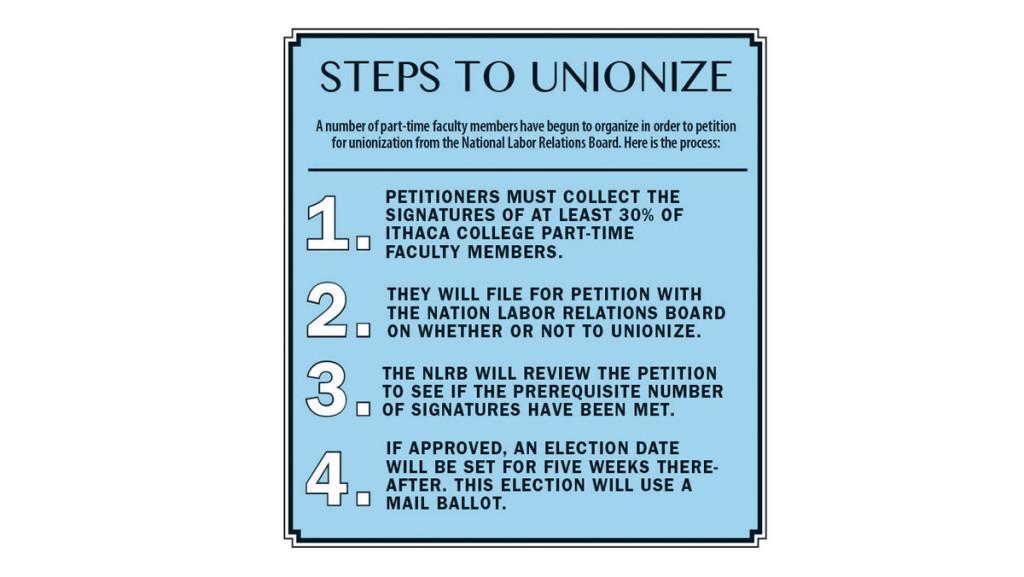Part-time faculty members at Ithaca College have begun to organize in order to form a union at the college.
Since the spring of 2014, part-time faculty members have been organizing with the help of Adjunct Action, a part of the Service Employees International Union Local 200United, according to a Jan. 27 press release by the college’s part-time faculty members seeking unionization. Brody Burroughs, lecturer in the art department, said the group plans on filing for its union with the National Labor Relations Board, which will assign a date for the election that is five or six weeks later.
Rachel Kaufman, a part-time faculty member and adjunct lecturer in the college’s writing department, said the organizers are seeking a fairer living wage and access to benefits, such as health insurance, when they file sometime this spring. She also said unionization will allow part-time faculty to gain a voice on campus.
“We want to be an integral part of campus and have fairer and better compensation,” Kaufman said. “If you look at the pay rate, adjunct (sic) professors are paid much less even though we are teaching the same courses and of the same quality. Teachers’ working conditions go hand-in-hand with student learning conditions.”
There are currently 277 part-time instructional faculty members at the college, accounting for about 36 percent of all instructional faculty, according to the college’s common data set released by the Office of Institutional Research.
According to the college’s Faculty Handbook, a part-time, per-course faculty member is expected to have a term of fewer than three years and only take on 50 percent or less of a full-time professor’s workload, which is a maximum of 24 credits per year and also includes additional responsibilities like being an academic adviser to students and potentially conducting their own research. An adjunct has an expected term of three years or more and is responsible for 58 percent or more of the full-time workload.
The press release also stated part-time faculty are currently paid $1,300 per credit hour and generally are signed to three-month contracts. Michael Smith, full-time associate professor in history, said part-time faculty members teach 15 or 16 percent of classes and are seeking to get paid about $2,000 per credit hour.
Dave Maley, senior associate director for media and community relations, said in a statement Jan. 28 the college recently has become aware of the unionizing part-time faculty members.
“It is yet to be seen if a majority of the college’s part-time faculty will adopt this view,” Maley said. “This is an important issue, and the college encourages those involved to get as much information as possible before making a final decision.”
Before the part-time faculty members involved can file for petition with the NLRB on whether to unionize, they must collect signatures from at least 30 percent of all part-time faculty members on campus. Kaufman said the organizers are looking to acquire more signatures than are required in order to make a more striking impression.
Once the signatures are collected and the organizers have filed for petition, the NLRB will confirm whether or not the requirements for the number of signatures have been met. If this is approved, an election date will be set, and the organizers will mail ballots to all part-time faculty, Kaufman said.
Kaufman also said 80 percent of part-time faculty who have been contacted have been in agreement with the unionization, and tenured faculty members have also expressed their support.
Smith said he supports the organizers.
“Both at Ithaca College and nationwide, part-time faculty are marginalized and underpaid in most cases organizing as a collective bargaining unit gives them more power to negotiate for better working conditions,” Smith said.
Smith said he was approached several months ago by the organizers of the unionization movement in order to garner support from full-time faculty members.
“There seems to be a pretty strong support from full-time faculty for this,” he said. “It’s not universal, but I think there is a recognition that what adjuncts are interested in getting, which is a more equitable pay scale and more predictability in work, are quite reasonable requests.”
Smith added that he was helping circulate a letter among faculty to get support.
Peter Rothbart, chair of the faculty council and professor of music theory, said he was not surprised by the development.
“I think it will cause the college to revisit and clarify the roles of adjuncts versus part-timers and how the college employs them,” he said.
He said the faculty council has long been in favor for increased pay to part-time faculty, who have not received an increase in pay since 2009. Since the cost of living has increased, part-time faculty over the past six years have endured a loss of real income. Rothbart said the faculty council would be discussing the issue in the future.








